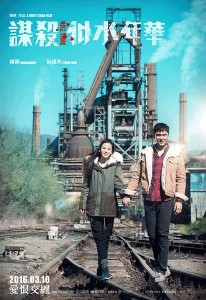Kill Time
谋杀似水年华
China/Hong Kong, 2016, colour, 2.35:1, 126 mins.
Director: Chen Guo 陈果 [Fruit Chan].
Rating: 7/10.
Multi-layered, China-set murder mystery is another challenging genre mash from Hong Kong film-maker Chen Guo [Fruit Chan].
Beijing, 8 May 1995. Police detective Tian Yuejin (Yin Zhusheng) is called out to the murder of a young woman, Xu Bizhen (Xia Zihan), who’s been found strangled at her provisions shop in a scungy suburb. Tian Yuejin finds the woman’s 13-year-old son, Qiu Shou (Su Jiahang), hiding at the scene of the crime. Twenty years later, in 2015, Tian Yuejin’s daughter, Tian Xiaomai (Angelababy), hears of her father’s death in the line of duty. Going through his things, she reads his notes on the unsolved case which mention the murder implement, a purple scarf; while searching for something on a shopping website called Witch Zone 魔女区 – which her best friend and work colleague Qian Ling (Rayza) has warned her against using – Tian Xiaomai finds herself invited to buy a purple scarf. Tian Xiaomai is engaged to Qian Ling’s former boyfriend, Sheng Zan (Zhang Chao), the son of wealthy parents (Kou Zhenhai, Pan Hong). Soon afterwards, Qian Ling is found strangled by a purple scarf  identical to the one Tian Xiaomai bought, and has left behind a message saying “I killed someone!” The detective in charge of the case, Wang Zhixian (Huang Jue), used to work under Tian Xiaomai’s father; he also sees parallels with the 1995 murder that took place opposite Tian Xiaomai and Qian Ling’s school, Nanming Senior High. Later, Tian Xiaomai receives another delivery from Witch Zone, whose motorbike courier somehow managed to leave it inside her flat when she was out. (Back in 1995 Tian Yuejin took pity on Qiu Shou and let him stay with him and the teenage Tian Xiaomai [Li Yichen], who was initially resentful of the boy’s presence. Qiu Shou later moved out, and five years later, in 2000, Tian Xiaomai met him [Ruan Jingtian] when he was working in a neighbourhood provisions shop with his sick father. Both kids were then aged 18.) Alerted by Tian Xiaomai’s suspicions, the police are now monitoring Witch Zone’s courier service, but a delivery to Tian Xiaomai’s office turns out to be a false alarm. (Back in 2000 Qiu Shou declared his love for Tian Xiaomai, though a jealous rival tried to get him to back off. Qiu Shou and Tian Xiaomai were happily in love, but one day he suddenly went missing.) The police question Gu Fei (Song Ning), owner of Witch Zone, and Tian Xiaomai suspects his secret partner is Qiu Shou. Gu Fei claims he works alone, but Tian Xiaomai tells him to tell Qiu Shou that she’s still waiting for him. After Sheng Zan and Tian Xiaomai attend a birthday party for his father (Kou Zhenhai), Sheng Zan is kidnapped by a man in a biker suit who’s been following and photographing the couple. Wang Zhixian now suspects that Qian Shou has secretly returned to Beijing after many years, and that the whole case is linked to Tian Yuejin and the time he spent in Yunnan province as a young man during the Cultural Revolution. Tian Yuejin, Sheng Zan’s parents and Qiu Shou’s mother were then all in the same workers’ brigade.
identical to the one Tian Xiaomai bought, and has left behind a message saying “I killed someone!” The detective in charge of the case, Wang Zhixian (Huang Jue), used to work under Tian Xiaomai’s father; he also sees parallels with the 1995 murder that took place opposite Tian Xiaomai and Qian Ling’s school, Nanming Senior High. Later, Tian Xiaomai receives another delivery from Witch Zone, whose motorbike courier somehow managed to leave it inside her flat when she was out. (Back in 1995 Tian Yuejin took pity on Qiu Shou and let him stay with him and the teenage Tian Xiaomai [Li Yichen], who was initially resentful of the boy’s presence. Qiu Shou later moved out, and five years later, in 2000, Tian Xiaomai met him [Ruan Jingtian] when he was working in a neighbourhood provisions shop with his sick father. Both kids were then aged 18.) Alerted by Tian Xiaomai’s suspicions, the police are now monitoring Witch Zone’s courier service, but a delivery to Tian Xiaomai’s office turns out to be a false alarm. (Back in 2000 Qiu Shou declared his love for Tian Xiaomai, though a jealous rival tried to get him to back off. Qiu Shou and Tian Xiaomai were happily in love, but one day he suddenly went missing.) The police question Gu Fei (Song Ning), owner of Witch Zone, and Tian Xiaomai suspects his secret partner is Qiu Shou. Gu Fei claims he works alone, but Tian Xiaomai tells him to tell Qiu Shou that she’s still waiting for him. After Sheng Zan and Tian Xiaomai attend a birthday party for his father (Kou Zhenhai), Sheng Zan is kidnapped by a man in a biker suit who’s been following and photographing the couple. Wang Zhixian now suspects that Qian Shou has secretly returned to Beijing after many years, and that the whole case is linked to Tian Yuejin and the time he spent in Yunnan province as a young man during the Cultural Revolution. Tian Yuejin, Sheng Zan’s parents and Qiu Shou’s mother were then all in the same workers’ brigade.
REVIEW
After re-energising his career with the apocalyptic, sci-fi comedy-horror The Midnight After 那夜凌晨,我坐上了旺角开往大埔的红van (2014), Hong Kong director Chen Guo 陈果 [Fruit Chan] maintains his creative mojo with the very different but equally challenging Kill Time 谋杀似水年华, a multi-layered, China-set murder mystery that reaches back from the present to the Cultural Revolution as the complex story unravels. The plot requires a considerable suspension of disbelief but does make sense on its own terms, and maintains its mystery and suspense pretty much intact across two hours.
Chen and Mainland co-writer Li Qianxun 李仟浔 have stuck closely to the source novel while interpreting it in a fluid, cinematic way, shifting back and forth between three time periods (2015, 2000, 1995) but always in a clear manner, thanks to fine production design by Hong Kong’s Xi Zhongwen 奚仲文 [Yee Chung-man] and Wu Lilu 吴里璐 [Dora Ng] and terrific widescreen camerawork by Chen’s regular d.p. Lin Huaquan 林华全 which differentiates the periods by subtle colour coding. Along with an unusually good score by Hong Kong’s Li Yunwen 李允文 [Henry Lai] which supports the shifts in emotional tone, Lin’s lighting is also key to unifying the many moods: apart from being two whodunits in one, Kill Time also embraces a double love story, various “ghostly” goings-on, and class divisions reaching back 40-plus years – in other words, the usual genre mash-up (both arty and commercial) that Chen has always been interested in.
The 2011 source novel, Murdering Things Past 谋杀似水年华, by popular Shanghai-born writer Cai Jun 蔡骏, 37, was billed as his first “social” mystery-thriller. A long-limbed plot that reaches from a murder in the present back to an unsolved murder 20 years earlier, and then to the roots of everything in the apparent idealism of the Cultural Revolution a further 20 years earlier, it sometimes goes a bit soggy in the first-love material but pretty much holds the attention until the final flashback, when everything finally makes emotional sense. The ensemble cast – as broad in age as the story’s own time span – is equally responsible for the necessary suspension of disbelief. Veterans like actress Pan Hong 潘虹 (who comes through strongly in the final stages) and TV actors Kou Zhenhai 寇振海 (as her husband, ditto) and Yin Zhusheng 尹铸胜 (as the lead’s late father) provide a solid base for the rest of the cast, which includes Hao Lei 郝蕾 (playing older than she is, as a feisty taxi driver) and Huang Jue 黄觉 (as a slightly maverick detective).
The surprise, however, is the relative strength of the younger cast. In her first solo lead role in a major production, Mainland model-turned-actress Yang Ying 杨颖 [Angelababy], whose limited range has often proved a handicap, generally holds the screen as a detective’s daughter who’s drawn into a murder case that touches on her own first love 20 years earlier. Though she’s not called upon to carry the movie alone, Yang heads the ensemble well enough and holds her own against more experienced names like Huang, Yin and Pan. The same goes for Taiwan’s Ruan Jingtian 阮经天 (Monga 艋舺, 2010; The Unbearable Lightness of Inspector Fan 暴走神探, 2015) who shows much more presence than usual and the right amount of passion to make the central love story credible. As the other beau with a creepy past, China’s Zhang Chao 张超 (one of the better things in Somewhere Only We Know 有一个地方只有我们知道, 2015) is equally believable but in a more thinly-drawn role.
Despite its local flavour and financing, The Midnight After was hardly a love letter to the territory, and the majority-Mainland financed Kill Time, which implies that New China’s tortured past is forever alive in its present, is hardly one to Mainland society either. Unlike Midnight, however, which played up to Chen’s maverick indie image, Kill is a finely tooled piece of intelligent mainstream cinema, marbled with maverick moments. Its complex time structure isn’t maintained in the second half, which is more linear after a series of revelations at the midway point; but that gives a chance for the movie’s emotional side to build, with some particularly touching moments between Yin’s detective father and Yang’s daughter.
Like the book, the film memorialises late, great pop singers of the period, including Taiwan’s Deng Lijun 邓丽君 [Teresa Teng], Beyond founder Huang Jiaju 黄家驹, and Hong Kong’s Chen Baiqiang 陈百强 [Danny Chan], Zhang Guorong 张国荣 [Leslie Cheung] and Mei Yanfang 梅艳芳 [Anita Mui]. The film’s Chinese title means “Murder: Time Flows By Like Water”.
CREDITS
Presented by Wanda Media (CN), Gootime Media (CN), Emperor Film Production (HK), Wanda Pictures (Qingdao) (CN). Produced by Gootime Media (CN).
Script: Chen Guo [Fruit Chan], Li Qianxun. Novel: Cai Jun. Photography: Lin Huaquan. Editing: Tian Shiba [Chen Guo]. Music: Li Yunwen [Henry Lai]. Theme song music: Li Yunwen [Henry Lai]. Lyrics: Chen Qiwen, Xie Weilun. Vocal: Twins. Production design: Xi Zhongwen [Yee Chung-man], Wu Lilu [Dora Ng]. Art direction: Li Miao. Costume design: Yu Jia’an [Bruce Yu]. Sound: Xue Xiaoshan, Zhu Zhixia. Visual effects: Deng Dongming (CG House).
Cast: Yang Ying [Angelababy] (Tian Xiaomai), Ruan Jingtian (Qiu Shou), Zhang Chao (Sheng Zan), Rayza (Qian Ling), Hao Lei (Ding, taxi driver), Pan Hong (Yuan Shuzhen, Sheng Zan’s mother), Yin Zhusheng (Tian Yuejin, Tian Xiaomai’s father), Huang Jue (Wang Zhixian, detective), Kou Zhenhai (Sheng Shihua, Sheng Zan’s father), Lin Xue [Lam Suet] (Zhang Hongmin), Song Ning (Gu Fei), Li Yichen (young Tian Xiaomai), Su Jiahang (young Qiu Shou), Xia Zihan (Xu Bizhen, Qiu Shou’s mother), Zhao Zhigang (Xiaoli), Shao Shengjie (Zhiqiang), Hei Wenli (Jiang Yan), Lu Jundong (Lu), Jin Jin (Lu Gang), Wang Kuang (young Tian Yuejin), Zhao Yixin (young Sheng Shihua), Qin Yu (young Yuan Shuzhen), Ma Erfa (young Xu Bizhen), Wang Jianjun (Tian Yuejin’s superior), Qiu Lin (village head).
Release: China, 14 Feb 2016; Hong Kong, 10 Mar 2016.
